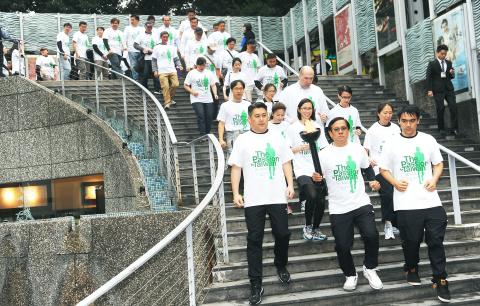A memorial concert was held yesterday in Taipei to pay tribute to late independence movement pioneer and former Democratic Progressive Party (DPP) lawmaker Chai Trong-rong (蔡同榮) in honor of his dedication to the pursuit of freedom, democracy and independence in Taiwan.
Chai died of multiple organ failure on Jan. 11 at the age of 78. He had been hospitalized after a brain stem hemorrhage left him in a coma on Dec. 18 last year.
Chai’s friends performed alongside musicians at the Metropolitan Hall, with songs that included some of the lawmaker’s favorites from his 30 years abroad, such as Homeland at Dusk (黃昏的故鄉) and I’m Coming Home (回鄉的我).

Photo: Chang Chia-ming, Taipei Times
Chai left Taiwan in 1960 for the US to go to graduate school. His pro-Taiwan independence activities while in the US resulted in the former Chinese Nationalist Party (KMT) regime barring him from returning home. It blacklisted him for three decades before he was able to return for a funeral in June 1990.
DPP Chairman Su Tseng-chang (蘇貞昌), former DPP chairperson Tsai Ing-wen (蔡英文) and former vice president Annette Lu (呂秀蓮) were among the senior party members who praised Chai’s lifelong pursuit of democracy in Taiwan and international recognition for the nation, especially his lobbying efforts in the US Congress.
“He will be greatly missed. And we will do our best to achieve his unfulfilled dream,” Su said.
“We are here today to look back on his achievement. Dr Chai will be remembered as one who has always done everything he could for his dream, for his perseverance and for his ‘never-say-die’ mentality,” Tsai said.
Chai lived in the US while in exile, founding the World United Formosans for Independence in 1970, which brought together pro-Taiwan independence groups in Japan, Europe, Canada and the US, and the Formosan Association for Public Affairs in Los Angeles in 1982. He also focused on lobbying the US Congress on behalf of Taiwan’s independence movement.
Chai served six terms in the legislature from 1993 to 2012 and helped push for legislation on the Referendum Act (公民投票法).
Additional reporting by staff writer

A preclearance service to facilitate entry for people traveling to select airports in Japan would be available from Thursday next week to Feb. 25 at Taiwan Taoyuan International Airport, Taoyuan International Airport Corp (TIAC) said on Tuesday. The service was first made available to Taiwanese travelers throughout the winter vacation of 2024 and during the Lunar New Year holiday. In addition to flights to the Japanese cities of Hakodate, Asahikawa, Akita, Sendai, Niigata, Okayama, Takamatsu, Kumamoto and Kagoshima, the service would be available to travelers to Kobe and Oita. The service can be accessed by passengers of 15 flight routes operated by

Alain Robert, known as the "French Spider-Man," praised Alex Honnold as exceptionally well-prepared after the US climber completed a free solo ascent of Taipei 101 yesterday. Robert said Honnold's ascent of the 508m-tall skyscraper in just more than one-and-a-half hours without using safety ropes or equipment was a remarkable achievement. "This is my life," he said in an interview conducted in French, adding that he liked the feeling of being "on the edge of danger." The 63-year-old Frenchman climbed Taipei 101 using ropes in December 2004, taking about four hours to reach the top. On a one-to-10 scale of difficulty, Robert said Taipei 101

MORE FALL: An investigation into one of Xi’s key cronies, part of a broader ‘anti-corruption’ drive, indicates that he might have a deep distrust in the military, an expert said China’s latest military purge underscores systemic risks in its shift from collective leadership to sole rule under Chinese President Xi Jinping (習近平), and could disrupt its chain of command and military capabilities, a national security official said yesterday. If decisionmaking within the Chinese Communist Party has become “irrational” under one-man rule, the Taiwan Strait and the regional situation must be approached with extreme caution, given unforeseen risks, they added. The anonymous official made the remarks as China’s Central Military Commission Vice Chairman Zhang Youxia (張又俠) and Joint Staff Department Chief of Staff Liu Zhenli (劉振立) were reportedly being investigated for suspected “serious

Taiwanese and US defense groups are collaborating to introduce deployable, semi-autonomous manufacturing systems for drones and components in a boost to the nation’s supply chain resilience. Taiwan’s G-Tech Optroelectronics Corp subsidiary GTOC and the US’ Aerkomm Inc on Friday announced an agreement with fellow US-based Firestorm Lab to adopt the latter’s xCell, a technology featuring 3D printers fitted in 6.1m container units. The systems enable aerial platforms and parts to be produced in high volumes from dispersed nodes capable of rapid redeployment, to minimize the risk of enemy strikes and to meet field requirements, they said. Firestorm chief technology officer Ian Muceus said